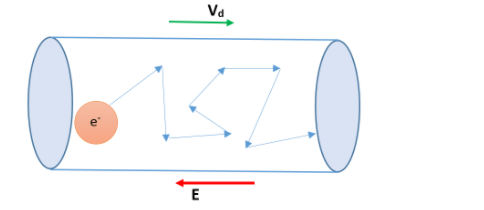Question
Question: Derive an expression for drift velocity of free electrons in a conductor....
Derive an expression for drift velocity of free electrons in a conductor.
Solution
Consider electrons as infinitesimal free particles in the conductor experiencing force due to an electric field. We can calculate the force on each electron, and find the acceleration. Drift velocity is the average velocity of all the electrons in a given space.
Formula used:
Force on a charged particle in an electric field is given by,
F=qE ……………… (1)
Where, q is the charge of the particle, and E is the electric field.
The general kinematics equation,
v=u+at …………… (2)
Where,v is the final velocity,
u is the initial velocity,
a is the acceleration,
and t is the time duration.
Complete step by step answer:
Let’s assume we have an electric field E in the conductor.
For now, we are going to consider only one electron, and calculate the acceleration of the electron due to this electric field.

As the force due to the electric field is much more than the electron-electron interaction, we are not going to consider that.
Let’s consider the charge of an electron to be (-e).
Hence, the force on the electron is equal to
F=−eE
We can find the acceleration of the electron by,
a=mF=−meE
Where m is the mass of the electron.
Now, let us introduce a quantity called the relaxation time. It is the average time between two consecutive collisions.
Let’s assume there are ‘n’ number of electrons in the conductor at any given time.
The relaxation time is given by,
τ=nτ1+τ2+τ3+τ4+....
Where, [τ1,τ2,τ3,τ4,....] are the collision times of n electrons.
We can say that the drift velocity is the average velocity of all the electrons.
So, we can write,
vd=nv1+v2+v3+v4+v5+....
We can use the general kinematics equation,
v=u+at …………… (2)
Where, v is the final velocity,
u is the initial velocity,
a is the acceleration,
and t is the time duration.
Using equation (2) we get,
vd=n(u1+u2+...+un)+a(τ1+τ2+...+τn)
⇒vd=0+na(τ1+τ2+...+τn) -- (Initial average velocity is zero)
